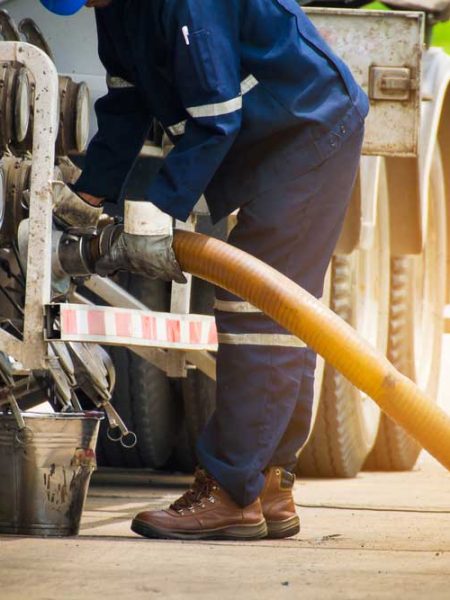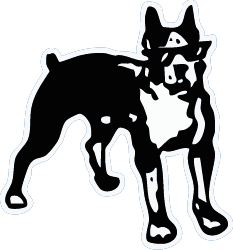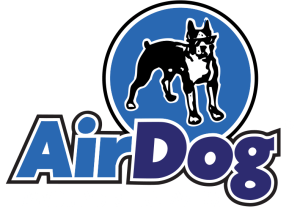

The diesel engines found in heavy-duty trucks can seem bulletproof. It’s true, they are tough and durable. But they are not invincible. Some things—like air in the fuel system—can cause serious problems that you want to avoid as much as possible.
Air in the fuel line symptoms can include difficulty starting, reduced power, and even failing to start at all. And the unfortunate reality is that you can’t completely keep air out of the system. The sloshing diesel in your fuel tank is going to get air bubbles in it. However, you can remove the air before it gets to the engine with AirDog®.
It’s important to understand where air in the fuel line of a diesel engine can enter the system. That way, you can do what you can to minimize the risk and address the problem when it does occur.
The fuel in the fuel tank of a moving vehicle is always sloshing around. Every bump, corner, stop, and acceleration shifts the fuel around. All that sloshing introduces air into the fuel.
Tank slosh stirs up fuel into a bubble-filled froth and that vapor is pulled into the fuel line along with the fuel. There is no economical way to avoid air in the fuel tank. The best option is to have a system for removing that air before it gets to the engine.
The hoses and fittings that make up the fuel system can be the source of air penetration. Hoses degrade and can develop holes. They can be punctured by accident. Fittings break or can be installed incorrectly. Any part of the fuel system that wears out, breaks, or is improperly installed, can be a source of air into the system.
Keeping a regular maintenance schedule for your diesel can help prevent this type of issue and identify leaks when they do occur.
With many engines using a gear-driven transfer pump, it’s common to see cavitation which can lead to vapor formation. The system is under a kind of suction from the transfer pump which contributes to vapor development.
As you follow your fuel lines, you will notice how often they take sharp turns to make their way through the maze under the hood. Those sharp turns and nooks in the fuel system contribute to vapor formation as well.
Air in a diesel fuel system can lead to frustrating problems. If enough air is present it can lead to airlock, which prevents fuel from reaching the engine. When severe, the engine won’t even start.
Even when the engine does start, you can still experience performance issues like unstable idling, black smoke from the exhaust, decreased power, and uneven engine operation when traveling at high speeds.
Air can cause excessive wear on parts as well, like the fuel injectors. When the fuel injectors are operating without enough fuel there is not enough lubrication to prevent metal-on-metal contact.
All these problems could make it much more difficult to operate the truck as intended. It may not start at all, or it may provide uneven performance that affects reliability and efficiency.
AirDog®fuel systems are designed to remove air and water from diesel fuel before it enters the engine. These systems are very effective and ideal for addressing the persistent problems of fuel slosh, cavitation, and the consistent introduction of air into the fuel lines these cause. Although these systems are not a substitute for proper maintenance—to prevent and address holes in fuel lines, cracked fittings, and so on—AirDog® is a strong line of defense against air reaching the engine when such problems do occur.
AirDog® utilizes a three-step process to eliminate air in fuel: First, it sends fuel through a water separator to eliminate moisture and particulates as small as 30 microns. Then, the fuel goes through the particulate, which removes particulates as small as 6 microns and also separates air from the fuel. Last, the AirDog® integrated fuel pump pushes the purified diesel to the engine at consistent, positive pressure.
The integrated pumps are particularly helpful in reducing the opportunity for air to enter the system because they prevent vapor formation and lessen cavitation.
With traditional fuel filters, it’s easy to forget to prime the filter and thereby introduce air into the system. But with AirDog®, you don’t have to prime the fuel filter. As long as you prime the water separator with fuel, there will be no opportunity for air to get into the system with each installation.
There are several things you can do to help avoid the introduction of air into your diesel fuel. These include:
If you are operating a commercial truck, you are probably already aware of the importance of routine maintenance. For your safety and the safety of others on the road, it’s vital to adhere to recommended maintenance schedules with heavy-duty trucks.
A regular maintenance check will likely identify common problems like worn-out fuel lines and broken fittings. It will also ensure that your AirDog® filters are changed out at the appropriate intervals.
All of the instructions you find for bleeding fuel lines always start by telling you to find and fix any leaks first. That’s because you don’t want to go to all of the trouble to bleed the air out if a hole will just allow more air in when you start the engine.
Air in diesel fuel causes so many headaches. It’s a necessity to fix leaks as soon as you can to avoid serious issues with your engine’s performance.
We love our AirDog® systems and are proud of how effective they are at removing air and contaminants from diesel fuel. However, we want to emphasize that they are no substitute for proper maintenance. Our systems are ideal for handling the inevitable air and vapor issues caused by routine diesel engine operation, but you should always address damaged fuel lines, fittings, and other concerns as soon as possible.
Nobody wants air in their diesel fuel if they can help it. When air stays in the fuel as it reaches the engine, it can cause performance issues, damage fuel injectors, and even keep the engine from starting completely.
To avoid these issues, keep up with routine maintenance, fix any problems as they arise, and take advantage of AirDog® fuel filtration systems to eliminate air before it reaches your engine.
Contact us today to learn more about AirDog® and discover what makes us the go-to choice for diesel fuel filtration for heavy-duty truck operators.


Heavy-duty diesel fuel systems from AirDog will help increase your mileage and injector life by removing water, vapor and contaminants. Made in the USA since 1990.
PUREFLOW™ TECHNOLOGIES, INC.
5508 Business 50 West
Jefferson City, MO 65109
© 2025. All rights reserved.
Site by Zimmer Communications